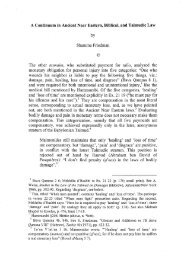Wimpfheimer_ Is it not so.pdf
Wimpfheimer_ Is it not so.pdf
Wimpfheimer_ Is it not so.pdf
Create successful ePaper yourself
Turn your PDF publications into a flip-book with our unique Google optimized e-Paper software.
84 ❙ Barry <strong>Wimpfheimer</strong><br />
64 Though arguments of empathy are di³cult to make w<strong>it</strong>hin civil cases in light of the<br />
fact that one side's loss is a<strong>not</strong>her's gain, the context of bailees (at least in the Talmud)<br />
is generally one of economic imbalance. Siding w<strong>it</strong>h the bailee is<br />
tantamount, then, to siding w<strong>it</strong>h the poor. Though justice might demand that the<br />
poor receive no greater stake, this <strong>so</strong>rt of leaning is often a necessary corrective to<br />
the real-world real<strong>it</strong>ies of judicial imbalance in the oppos<strong>it</strong>e direction. W<strong>it</strong>hin<br />
American law, this is often illustrated w<strong>it</strong>hin the <strong>not</strong>ion of unconscionabil<strong>it</strong>y and<br />
Williams v. Walker-Thomas. A similar <strong>not</strong>ion can be found in <strong>Is</strong>a. 11:4, which as<strong>so</strong>ciates<br />
true justice w<strong>it</strong>h a correction for the poor. Some might question such a<br />
reading of Rava as inconsistent w<strong>it</strong>h the biblical law that mandates that ne<strong>it</strong>her the<br />
rich nor the poor receive unequal treatment in light of their di²ering monetary s<strong>it</strong>uations.<br />
Yet <strong>it</strong> is undeniably the case that when Rava rules to accept the claim,<br />
``What should he have done?'' he is doing precisely that, since the legal protections<br />
o²ered to the wealthy bailee are being breached when the wealthy one is made to<br />
su²er a loss while seemingly under the protection of the bailor's liabil<strong>it</strong>y.<br />
65 Rubenstein, Talmudic Stories, 275, argues that shame is a common feature of Babylonian<br />
stories, particularly w<strong>it</strong>h respect to their Palestinian parallels. Je²rey L.<br />
Rubenstein, ``The Bavli's Ethic of Shame,'' Conservative Judaism 53 [2001]: 3,<br />
27±39, further articulates the cultural signi®cance of this focus on shame. Most of<br />
his examples are from nonlegal narrative; the occurrence of shame in this legal narrative<br />
is rare.<br />
66 For an articulation of the various con¯icts responsible for creating law, see Pierre<br />
Bourdieu, ``The Force of Law: Toward a Sociology of the Juridical Field,'' The<br />
Hastings Law Journal 38 (July 1987): 814±53.<br />
67 Echoes of Rava's tension can be found in a medieval argument. Rambam Sekhirut 2:3<br />
asserts that a bailee who is negligent w<strong>it</strong>h a slave must pay damages ``because anyone<br />
who is negligent is a tortfea<strong>so</strong>r.'' Ra¥bad ad loc. attacks this pos<strong>it</strong>ion, reprising<br />
the role of Rava's students, by saying, ``One who is negligent is <strong>not</strong> a tortfea<strong>so</strong>r, for<br />
were this the case, why would negligence in the owner's presence be exonerated?''<br />
In other words, Rambam is moved by the egregiousness of negligence, and <strong>it</strong>s status<br />
as an exception to statutory law to transfer <strong>it</strong>s case from the status of insurance<br />
liabil<strong>it</strong>y to that of tort liabil<strong>it</strong>y. This logic is akin to Rava's focus on fault and his<br />
assumption that negligence brings automatic liabil<strong>it</strong>y. Ra¥bad recognizes our case<br />
of owner presence as the lim<strong>it</strong> case that prevents negligence from becoming a tort.<br />
This argument demonstrates the impact of this legal story on a broader area of law.<br />
68 In this argument, I am explaining <strong>not</strong> only Rava's shame, but his silence. Saddened by<br />
the fact that he has been historicized, Rava is silent in his shame. His shame is<br />
interconnected w<strong>it</strong>h this sadness.

















